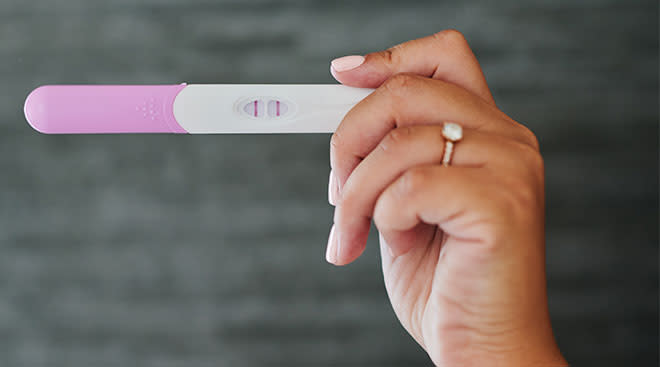MATERNAL AGE
Your age as a woman is the single most important factor in determining your chances of getting pregnant.
| NUMBER OF EGGS IN A WOMAN
5th month in the womb: 5 – 7 million At birth: 1.5 million At puberty: 500, 000 At 25 years: 300, 000 |
At birth, a lady is born with a total of 1 – 2 million eggs. These are the total number of eggs she will have. For some reasons not completely understood, about half the total number of eggs are lost before puberty.
From puberty to menopause, you will ovulate about 400 times. During the menstrual cycle several follicles, possibly up to 1, 000 are recruited from the large store of eggs in the ovaries with only one egg becoming the dominant one and getting released from the ovary in the process called ovulation. The other eggs that did not grow large enough to become the dominant ones get reabsorbed by the body.
From age 35 years, the quality and quantity further diminish quickly till menopause which occurs from 48 years. The diminished quality and quantity of eggs occasionally lead to a delay in getting pregnant and increases the chances of miscarriages and babies being born with congenital problems.
The best time to get pregnant is before 30 years, but that’s not a problem. Lots of women start their childbearing career after 30 years and many do well.
PATERNAL AGE
Men older than 40 years of age experience a decline in the quality and quantity of sperm cells than their younger counterparts.
Another factor that may affect men is the presence of chronic medical diseases such as hypertension and diabetes and the effect of the drugs used to manage them on sperm quality and quantity. Episodes of erectile dysfunction may also increase the challenges.
OVERWEIGHT
Obese women may find it more challenging getting pregnant because of the extra body fat cells which get converted to the hormone estrogen and suppress the normal release of the hormone FSH [Follicular Stimulating Hormone] necessary for the release of the eggs.
Thus, significantly overweight women may not ovulate regularly. Checking your BMI [Body Mass Index] helps determine if you’re underweight or overweight. Obese women are also at risk of several health challenges that either reduce their chances of getting pregnant or pose a risk for them and the developing baby. These include Hypertension, Type 2 Diabetes, and Polycystic Ovarian Syndrome among others.
For the obese lady, modest reductions in weight may have a beneficial effect on pregnancy and its outcome. Weight loss is not advised during pregnancy, but counselling regarding appropriate weight gain is advisable. The goal of weight loss is geared towards the development of dietary control and exercise habits that help her sustain a healthy weight throughout her lifetime.
UNDERWEIGHT
If you are underweight with a BMI of less than 20 or weight less than 45 kg, you may find out that your menstruation is irregular or has stopped.
This is seen in many women with Anorexia or Bulimia and could pose challenges when they try getting pregnant. Getting your weight right is important by developing a good feeding practice.
| BMI Values Range [kg/m2]
Underweight < 20 Normal BMI 20 – 24.9 Overweight 25 – 29.9 Obese ≥ 30 Morbid Obesity ≥ 40 |
How to calculate your BMI
Your BMI is calculated as
| Weight [Kg] | |
| Height [meter square/ m2] | |
For example, if your weight is 80 kg and height is 5 feet 6 inches i.e. 170cm [1.7 m]
BMI = 80/ [1.7 x1.7] = 27.7 kg/m2
A BMI of 27.7 is overweight and falls outside the normal weight range
PRESCRIPTION DRUGS
While trying to get pregnant it is important to abstain from all medications as much as possible. Medications contain substances that could cross the placenta at significant concentrations and cause some harmful effects to the vulnerable developing embryo.
This means while waiting for your next menses just after ovulation, it is safe to assume you are pregnant and keep off from medications as much as you can. However, if you’re on a medication prescribed by your doctor you should get the permission of your doctor before stopping it [there could be a safer alternative in pregnancy]. It could be dangerous to stop some medications suddenly, and it may be better for you (and your baby) to continue—even if you’re trying to conceive or are pregnant.
Common drugs which could impair fertility:
- Ibuprofen, Brustan, Felvin: It is commonly taken for pains, headache, and backache. It can affect ovulation and increase the risk of miscarriage.
- Antacid such as Gestid, Gaviscon, Gascol: It is commonly taken for tummy aches and digestive issues. It can reduce iron absorption and cause anaemia which is detrimental to fertility.
iii. Aspirin: Taken for pain relief. It can affect the implantation of fertilized eggs.
- Prednisolone: It is taken regularly by asthmatics. It can delay ovulation and cause irregular menses.
- Valproic Acid. It is taken by epileptics. It can halt the pregnancy or produce a birth/congenital malformation.
MANAGEMENT OPTIONS
Several options are available for women who need help getting pregnant as not everyone will be candidates for advanced fertility treatment.
A comprehensive evaluation of the couple is important in deciding the line of action. Options of management available at the NVH IVF include:
- Ovulation Induction
- Ovulation Induction with Intrauterine Insemination [IUI]
- In-Vitro Fertilization [IVF]
- Intracytoplasmic Sperm Injection [ICSI]
- Gestational Surrogacy
- Oocyte Donor [OD]
- Sperm Donor
- Oocyte Freezing
- Embryo Freezing
- Sperm Freezing
- Preimplantation Genetic Diagnosis [PGD]
- Sex determination

